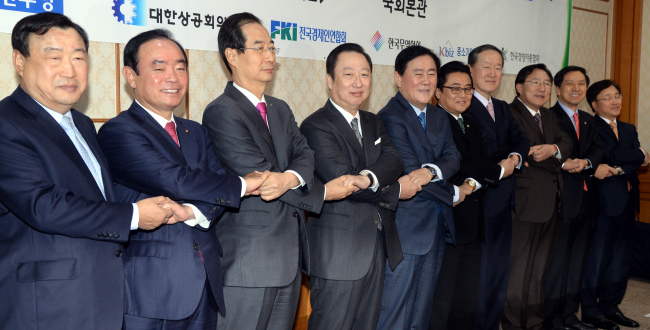 |
Rep. Choi Kyung-hwan (fifth from left) and Rep. Jun Byung-hun (sixth from left), floor leaders from the ruling and opposition parties, join hands with leaders from the nation’s five business associations before holding a meeting in the National Assembly on Friday. (Park Hyun-koo/The Korea Herald) |
Leaders from business and political circles agreed Friday to set up a consultative body to deal with pending economic issues including the passage of bills aimed at boosting the sagging economy.
The agreement was made after the main opposition Democratic Party floor leader Jun Byung-hun expressed the party’s unwillingness to cooperate with business leaders’ request for quick legislative action to pass some of the economic-related bills.
It is the first time that chiefs of the ruling and opposition parties have met leaders of the nation’s five business organizations to discuss the passage of economic bills.
In the meeting also attended by ruling Saenuri Party floor leader Choi Kyung-hwan, the business leaders urged the political party leaders to move forward in passing the pending business-friendly revision bills aimed at boosting the sluggish economy.
Huh Chang-soo, chairman of the Federation of Korean Industries, the nation’s largest business lobbying organization, said, “It is critical for the parliament to quickly pass 10 bills, which will ease rules and regulations against business activities, before the year end, if it seeks to revitalize the economy by leading companies to implement their 2013 investment plans as planned.
“Most Korean companies are still pressed by a number of uncertainties amid the protracted global economic downturn, and so they have no choice but to hesitate to push their investment plans without improvements in their business environments.”
The pending business-friendly bills that the business circles are pushing fall into three areas: The vitalization of the real estate market, support of small- and mid-sized companies, and the facilitation of corporate investments.
Among those bills, business leaders have pushed for the passage of two investment-friendly bills the most.
One of them is a bill to ease the tight rule against joint-venture creation between a grandchild company of conglomerates and a foreign company. If the bill passed, SK Group and GS Group will be able to push for their more than 1 trillion won investment projects, aimed at creating a joint venture firm between their grandchild company and a foreign investor in the petrochemical sector.
The other investment-related revision bill allows hotel construction near schools. If the bill passes, Korean Air can push for its luxury hotel plan near Gyeongbokgung Palace in the heart of Seoul.
Doosan Group chairman Park Yong-maan, who leads the Korea Chamber of Commerce and Industry, urged the party leaders to delay bills to cut employees’ working hours and reduce the tax credit on energy-related corporate investments, citing they may put a financial burden on companies.
“A sudden increase in financial burden could overheat companies at a time when the economy conditions both at home and abroad are in bad shape,” Park said.
In an effort to strengthen communication channels between the two sides, the business and political leaders agree to have a regular policy discussion session where the parties’ chief policymakers and deputy heads of the business organizations will attend.
By Seo Jee-yeon (
jyseo@heraldcorp.com)








